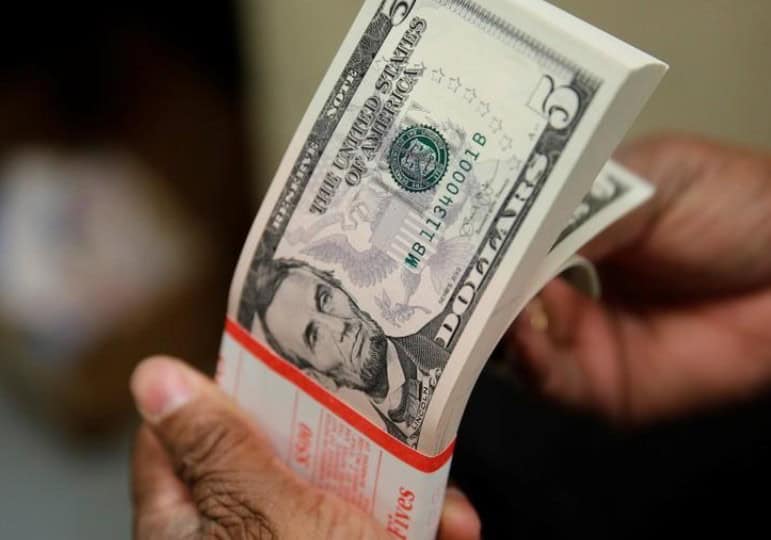
The U.S. dollar, which has dominated currency markets since early 2018, will continue to be a force to reckon with for at least the remainder of this year, according to a majority of currency strategists in a Reuters poll.
Despite being wrong-footed for years, strategists are still clinging on to their view of a weaker dollar in a year.
But analysts since the beginning of the year have repeatedly trimmed how much other major currencies will gain in 12 months, reflecting weakness in economies outside of the United States. They now see the euro climbing 3.5% and Japan’s yen about 2% against the dollar in the coming year.
The U.S. economy too is showing signs of a slowdown, hampered by the ongoing trade war with China and now firming expectations for policy easing from the Federal Reserve in coming months.
Still, the S&P 500 has repeatedly hit record highs and Treasury yields have fallen to multi-year lows, reflecting the increased interest in dollar-denominated assets, which should prop up the currency.
“Where we differ from the rather negative consensus view is that even if the Fed delivers those rate cuts, it still leaves the dollar as one of the highest-yielding G10 currencies and what we think the consensus misses is the role of outright yield,” said Adam Cole, head of FX strategy at RBC.
“The fact is that U.S. rates are going to be falling. But what is propping the dollar up – and has done for most of this year – is that even with those rate cuts, the yield is still high and this is a kind of environment where carry (trade) matters.”
While the consensus in the July 1-4 poll of over 80 analysts suggests a weaker dollar view, three-quarters of respondents to an additional question said the greenback’s dominance is not yet over and they expect it to last at least for the remainder of this year.
That includes over 50% of strategists who predict the dollar’s reign to continue for more than a year.
But the currency is not likely to maintain the same momentum. Robust economic performance, which fueled the greenback to dizzying heights, has started to fade.
That was reflected in the latest positioning data, which showed currency speculators cut their bets in favor of the dollar to the lowest since January, according to the U.S. Commodity Futures Trading Commission.
“The dollar is rolling over a little bit now because markets are pricing in more aggressive rate cuts,” said Gavin Friend, senior market strategist at NAB.
“But if those rate cuts are going to be delivered, it is because there has been no resolution to the global trade situation and that is not going to be helpful to European growth.”
Exacerbated by trade tensions, the euro zone growth and inflation outlook have both taken a hit.
To combat that, European Central Bank President Mario Draghi has called for “additional stimulus”, which many economists predict will either come in the form of a deeper negative deposit rate or by a tweak to the central bank’s forward guidance.
The euro EUR= was forecast to gain 3.5% to $1.17 in a year from about $1.13 on Thursday, similar to last month’s poll, which was the lowest prediction in almost two years.
But the risk to that already-subdued euro outlook is skewed more to the downside, said a majority of strategists in response to a separate question.
“With every successive year and more information we get about how the economy is responding – how high can the euro go keeps getting ratcheted down every single time,” said James Orlando, senior economist at TD Securities.
“Yes, there is a likelihood the euro can appreciate. But it is consistently less and less than it was the previous year.”
But despite easing measures widely expected from both the ECB and the Bank of Japan, not everyone agrees that would weaken those respective currencies.
The yen JPY=, which is up over 1.5% this year, is forecast to gain around 2% in a year to trade around 106 yen to the dollar. It was around 107.8 on Thursday.
“Irrespective of the ECB fiddling around at the edges of what they can do with monetary policy – in the same way as the Japanese have done with theirs – the ECB won’t be able to fight euro/dollar moving to $1.20 anymore than the Bank of Japan can prevent the dollar/yen heading down to a 100,” said Kit Juckes, chief global FX strategist at Societe Generale.
“Nothing the ECB does will be as important as what the Fed would do. Nothing the ECB does will be as important as how much pressure – possibly – U.S. President Donald Trump puts on (the Fed) to get a weaker dollar.”
























